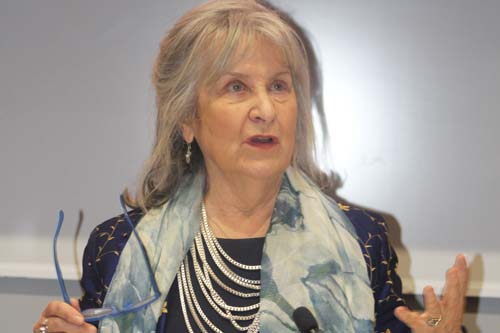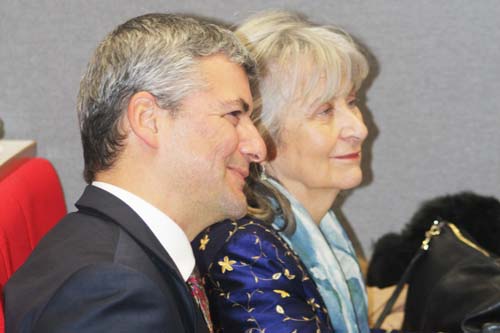Baroness Helena Kennedy KC, one of Britain's most distinguished lawyers, delivers the Centre's inaugural address.
By City Press Office (City Press Office), Published

City’s Centre for Law and Criminal Justice Research, an interdisciplinary Research Centre, has been established with the primary goal of addressing the numerous and intricate challenges affecting criminal justice at both domestic and international levels.
Domestically, these challenges encompass the reduction of legal aid services and the backlog of cases awaiting trial, which have been exacerbated by long-term funding cuts for police and the Crown Prosecution Service, as well as the COVID-19 pandemic lockdown. Internationally, the Centre will focus on the significant tensions between the potential for international criminal justice reform and the constraints of sovereignty and realpolitik.
The Centre was officially inaugurated at The City Law School on 14th March 2023. Professor Richard Ashcroft, Dean of The City Law School, commenced the event by welcoming attendees and delineating the Centre's primary objectives. The Centre will bring together scholars and practitioners from the fields of law, sociology, criminology, and politics to collaborate on generating impactful, innovative contributions to criminal justice research, scholarship, and practice, as well as spearhead public and policy debates on criminal justice matters. In alignment with the Centre's interdisciplinary focus, Professor Charles Lees, Dean of the School of Policy and Global Affairs, was also present.

Baroness Helena Kennedy KC, one of Britain's most distinguished lawyers, delivered the Centre's Inaugural Address. Introduced by co-director Dr Aldo Zammit Borda, Baroness Kennedy has devoted her professional life to advocating for civil liberties and human rights, particularly for those who are voiceless and with the least power within the system. Baroness Kennedy has been honoured by various governments for her work in human rights and has received over thirty honorary doctorates, including one from City, University of London.
Gradual and systemic degradation of law and standards
During her address, Baroness Kennedy discussed the gradual and systemic degradation of law and standards in both domestic and international contexts. She referred to policy decisions made in the wake of the 2008 banking crisis that significantly reduced funding for the justice sector, disproportionately impacting vulnerable and marginalized communities, including refugees and low-income families. Additionally, she noted the growing trend of international law violations committed not only by illiberal states but also, increasingly, by liberal states such as the United Kingdom, which set precedents for other nations to follow.
Baroness Kennedy highlighted how the Centre for Law and Criminal Justice sought to bring criminal lawyers (academics and professionals) together with criminologists because she noted that in the quest for meaningful criminal justice reform, the sum is much more effective than the parts. She also recognised that the human rights/criminal justice nexus has never been more important, or more under threat than in contemporary society. And she expressed concern about the devaluing of public service, the dismantling of the professions and the widening inequality gap, pointing out how this feeds into and is important for the criminal justice reform debate.
After the opening ceremony, guests had the opportunity to network and meet with the Centre's co-directors: Dr Cassandra Wiener, Dr Gemma Birkett, Professor Eugene McLaughlin, and Dr Aldo Zammit Borda. The organizers also expressed their gratitude to Ms. Hannah Curran-Troop and Ms. Matea Krivanek.
The City Centre for Law and Criminal Justice Research has an extensive and engaging series of activities scheduled for the near future.
